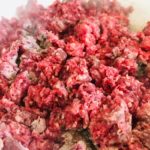Various news outlets are reporting that the Maine CDC says that there is a possible E. coli exposure at Morse's Sauerkraut located in Waldoboro, Maine. A food handler allegedly worked while infected with Shiga toxin-producing E. coli (STEC) from April 1, 2021 through May 13, 2021. The government has determined that patrons of that facility may be at risk for a STEC infection. Anyone who bought deli items from Morse's Sauerkraut between April 1, 2021 and May 13, 2021 should watch for symptoms of this infection. Symptoms usually develop a few days after exposure, but can show up as late as 10 days later. People usually experience a mild fever, nausea and vomiting, severe and painful abdominal and stomach cramps, and diarrhea that is bloody or watery. The Maine CDC recommends that … [Read more...]
How Do You Know If You Have Hemolytic Uremic Syndrome?
Hemolytic uremic syndrome can be a complication of a Shiga toxin-producing E. coli (STEC) infection that is a type of kidney failure. People who develop this condition often need dialysis and may even need kidney transplants. They can also suffer seizures. This condition can be life-threatening. Other causes of this condition include taking certain medications, having other types of infections, and inheriting a type of HUS that runs in families. In the group which has developed HUS after an E. coli infection, most are under the age of five. Among children younger than 18 who develop hemolytic uremic syndrome, about 80% have had STEC infections. About 5 to 10% of patients who contract STEC infections develop HUS. All patients with HUS should be hospitalized so their condition and … [Read more...]
Two E. coli Cases in Snohomish County, Washington Added to King County
Two E. coli cases in Snohomish County, Washington state, have been identified, according to a press release from the Snohomish Health District. These cases, in a 20-year-old woman and a 10-year-old child, are apparently connected to the seven children who are sick with Shiga Toxin-producing E. coli (STEC) infections in King County, Washington. The child has been hospitalized, but no further information about him or her has been shared with the public for patient privacy considerations. Dr. Chris Spitters, Health Information Officer for the Snohomish Health District, said in a statement, "The exact source of E. coli contamination can be difficult to pinpoint, but public health interviews lead us to believe the cases may be linked to eating fresh produce. While we continue working … [Read more...]
Seven Children Sick in E. coli Outbreak in King County, Washington State
According to a notice posted by the King County Public Health Department, there are seven children sick in an E. coli outbreak in King County. All are under the age of 14, and three children are under the age of five. Six of the children have been hospitalized. The source of the pathogen has not yet been determined. This new E. coli outbreak in King County has illness onset dates ranging from April 17, 2021 to April 29, 2021. The cases were reported to government officials between April 22, 2021 and May 1, 2021. The investigation is ongoing. Officials have not identified any restaurants, foods, or other sources in common among all of these cases. In fact, investigators do not know if the patients even share the same source of the pathogen. All seven children developed the … [Read more...]
Forty Leafy Greens STEC Outbreaks Occurring During 2009 to 2018
The October 2020 issue of the CDC's Emerging Infectious Diseases has a study about E. coli O157:H7 outbreaks from 2009 to 2018 and found that there were forty leafy greens STEC outbreaks during that time frame. STEC is Shiga toxin-producing E. coli bacteria, most often E. coli O157:H7. Those outbreaks caused 1,212 illnesses, 77 cases of hemolytic uremic syndrome (HUS), and eight deaths. More of those outbreaks were linked to romaine lettuce than any other type of leafy green. Forty-five percent of those outbreaks occurred in the fall, and 28% occurred in the spring. Leafy greens are the second most common source of foodborne STEC outbreaks, after ground beef. The connection between those two products is that cattle are considered the major reservoir for the pathogen, and STEC … [Read more...]
E. coli Outbreak at Acapulco Mexican Restaurant in Andover, MN
An E. coli outbreak at the Acapulco Mexican Restaurant in Andover, Minnesota has been confirmed by Doug Schultz, Information and Communications Officer for the Minnesota Department of Health. He said, "We are investigating a cluster of STEC cases that ate at the Andover location." That restaurant is located at 13753 Ibis St NW in Andover. The last time an ill person ate at that restaurant was in mid-August, 2019. The Minnesota Health Department does not consider this outbreak to be an ongoing situation. Dana Eikmeier, the epidemiologist working on this outbreak, told us that three adults were sickened. One was hospitalized, and no one developed hemolytic uremic syndrome (HUS). She also said it's likely that the DOH won't find the suspect food, since the case count was so … [Read more...]
Lawyer Asks: Why Are There Ground Beef E. coli Outbreaks?
One April, 2019 morning, amidst the ongoing ground beef E. coli O103 outbreak affecting much of the east-central United States, one of the attorneys on the foodborne illness team at the Pritzker Hageman law firm began her weekly meal preparation ritual. She went to her freezer and grabbed two pounds of frozen ground beef, defrosted it, and put it in a frying pan to brown. She has said her family of four goes through so much ground beef that she regularly fill my freezer with a “quarter of beef” raised by her father and processed by a local butcher shop. Her family "lives on it". In the U.S., a family’s subsistence on ground beef is not uncommon. For 2018, Americans were projected to eat 222.2 pounds of meat and poultry, each. According to the self-proclaimed “best information … [Read more...]
How is Ground Beef Contaminated with E. coli Bacteria?
E. coli outbreaks are typically associated with certain foods. There have been Shiga toxin-producing E. coli outbreaks linked to raw milk, raw sprouts, ground beef, and leafy greens in the past few years. A 2015 study found that most E. coli outbreaks are linked to beef. But how is ground beef contaminated with E. coli bacteria? The type of E. coli bacteria that causes serious human illness is called Shiga toxin-producing E. coli (STEC). That means the bacteria make a toxin that makes you very sick when it gets into your bloodstream. The government classifies these pathogens into two main groups: E. coli O157:H7, and the non-O157 serogroup, which includes E. coli O26, O111, O103, O121, and O145. All together, those six account for 75% of all STEC infections in the U.S. So how … [Read more...]
How Do You Know If You Have an E. coli Infection?
If you contract an E. coli infection, the symptoms are unmistakeable. Because of the toxins the pathogen produces, and how it attacks the body, patients know they are really ill. All pathogens are assigned a "multiplier" by public health officials. The number is chosen based on how many people actually go to a doctor when they contract food poisoning. The multiplier for Salmonella infections is 29, because not many people need to see a physician when they are ill. The multiplier for E. coli infections is 26, which is a surprisingly high number, given the severity of the symptoms. The main symptoms of E. coli infections are: Very severe and painful abdominal cramps Bloody and watery diarrhea Mild fever Those symptoms usually begin three to four days after … [Read more...]

![[caption id="attachment_96425" align="alignright" width="249"] Food Safety Lawyer and Food Poisoning Bulletin Publisher Eric Hageman[/caption] Noted food safety attorney Eric Hageman, who has represented many clients in E. coli and HUS lawsuits, said, "We certainly hope that officials can solve these outbreak soon so people stop getting sick. Any E. coli illness is a tragedy, and it's especially tragic when children are sick and hospitalized."](https://foodpoisoningbulletin.com/wp-content/uploads/Kidney-150x150.jpg)










